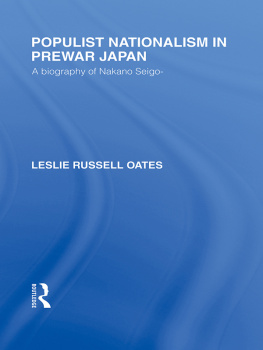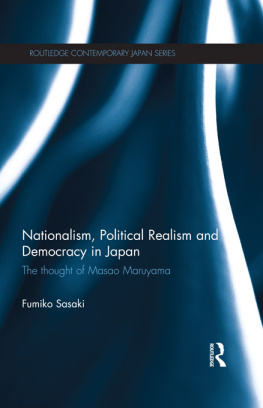ROUTLEDGE LIBRARY EDITIONS: JAPAN
POPULIST NATIONALISM IN PREWAR JAPAN
POPULIST NATIONALISM IN PREWAR JAPAN
A biography of Nakano Seig

LESLIE RUSSELL OATES
Volume 69

LONDON AND NEW YORK
First published in 1985
This edition first published in 2011
by Routledge
2 Park Square, Milton Park, Abingdon, Oxon, OX14 4RN
Simultaneously published in the USA and Canada
by Routledge
270 Madison Avenue, New York, NY 10016
Routledge is an imprint of the Taylor & Francis Group, an informa business
This edition published in the Taylor & Francis e-Library, 2010.
To purchase your own copy of this or any of Taylor & Francis or Routledges collection of thousands of eBooks please go to www.eBookstore.tandf.co.uk.
1985 Leslie Russell Oates
All rights reserved. No part of this book may be reprinted or reproduced or utilised in any form or by any electronic, mechanical, or other means, now known or hereafter invented, including photocopying and recording, or in any information storage or retrieval system, without permission in writing from the publishers.
British Library Cataloguing in Publication Data
A catalogue record for this book is available from the British Library
ISBN 0-203-84401-7 Master e-book ISBN
ISBN 13: 978-0-415-56498-4 (Set)
eISBN 13: 978-0-203-84317-8 (Set)
ISBN 13: 978-0-415-58869-0 (Volume 69)
eISBN 13: 978-0-203-84401-4 (Volume 69)
Publishers Note
The publisher has gone to great lengths to ensure the quality of this reprint but points out that some imperfections in the original copies may be apparent.
Disclaimer
The publisher has made every effort to trace copyright holders and would welcome correspondence from those they have been unable to trace.
Populist Nationalism in Prewar Japan
A biography of Nakano Seig
Leslie Russell Oates

George Allen & Unwin
Sydney London Boston
Leslie Russell Oates 1985
This book is copyright under the Berne Convention.
No reproduction without permission.
First published in 1985 by
George Allen & Unwin Australia Pty Ltd
8 Napier Street, North Sydney, NSW 2060 Australia
in association with
Department of Far Eastern History,
Australian National University
and
Asian Studies Association of Australia
George Allen & Unwin (Publishers) Ltd
18 Park Lane, Hemel Hempstead, Herts HP2 4TE England
Allen & Unwin Inc.
Fifty Cross Street, Winchester, Mass 01890 USA
Oates, L.R. (Leslie Russell), 1925
Populist nationalism in prewar Japan:
a biography of Nakano Seig

.
Bibliography.
ISBN 0 86861 111 5.
1. Nakano Seig

, 18861943. 2. StatesmanJapan Biography. 3. JapanPolitics and government1926 I. Australian National University. Dept. of Far Eastern History. II. Asian Studies Association of Australia. III. Title.
952. 033 0924
Library of Congress Catalog Card Number: 84-71887
Contents
Preface
This book is the outcome of studies and reflections going back to my own experiences in the Pacific War and its aftermath and maintained in the course of subsequent academic activities. More immediately it is based on a thesis submitted to the University of Melbourne. For help leading to its present form, I feel most fundamentally indebted to Mr Charles Bavier, a scholar and gentleman adventurer under whom I studied during the war and who was a long-term resident and devoted student of Japan, latterly in the
Ky to Shimbun
to Shimbun in the years before his death in 1976. More immediately I would like to express appreciation to Professor Harold Bolitho of Monash University for fruitful discussion; to Professor Hayashi Shigeru, formerly of Tokyo University, for general guidance and help in obtaining source materials; and to Professor Nakano Yasuo of the Ajia University, both for help in studies on his father and for subsequent illuminating contacts on various themes.
The number of brief unacknowledged quotations appearing in the text are all drawn from works listed in the bibliography, chiefly standard works and biographies.
Introduction
Since the Second World War, revulsion against the extreme nationalism which animated the Axis nations has tended, both within and outside them, to overshadow attempts to understand all the underlying factors. This particularly applies in the case of Japan where, although the basic forces propelling the nation towards war resembled those operating in Europe, the developments they triggered were very different.
It is true that broad similarities occur in the stresses to the social order precipitated by the First World War and culminating in the Great Depression. There was also a comparable reaction against the Marxist type of solution and a consequent search for salvation on the basis of traditional ideals, some supra-national when involving religious or broad cultural systems but in the main national when the states survival or autonomy was felt to be threatened. As the prospect or appeal of an international reconstruction on Marxist lines faded, national goals remained the only viable framework for action, even though plans for national salvation in the name of traditional values needed to be strengthened by drawing on elements of Marxist strategy.
Yet the detailed course of events was strikingly different between Japan and Europe. Whereas the European movements usually grouped as fascist successfully mobilised mass followings to establish single-party dictatorships, the parallel groundswell in Japan for national salvation and renovation failed to achieve anything like this, so that the common use of the term fascism to describe both the renovationist movement and the adjustments made by the ruling Establishment stretch the term beyond any descriptive utility. The indigenous term renovationist right (kakushin uyoku) has some justification in that the basic appeal was to national values and interests, though it leads to a confusing overlap with elements described as right wing which essentially supported the existing social order.
The reasons for the overall failure of the Japanese renovationist movement lie both in the nature of the Establishment and in that of the movement itself. The former, despite its complex divisions, succeeded in maintaining a politically viable degree of consensus, even if this was at the cost of finally diverting conflict to the international arena. The latter, despite a fairly wide spectrum of support including elements in the Establishment, utterly failed to produce any effective unification on the basis of either leadership or program comparable with European fascism. The most it achieved, apart from some reshaping of the Establishment, was some spectacular violence and an atmosphere of intrigue and agitation, while its constantly fissioning structure steadily removed it from political effectiveness.














 .
. to Shimbun in the years before his death in 1976. More immediately I would like to express appreciation to Professor Harold Bolitho of Monash University for fruitful discussion; to Professor Hayashi Shigeru, formerly of Tokyo University, for general guidance and help in obtaining source materials; and to Professor Nakano Yasuo of the Ajia University, both for help in studies on his father and for subsequent illuminating contacts on various themes.
to Shimbun in the years before his death in 1976. More immediately I would like to express appreciation to Professor Harold Bolitho of Monash University for fruitful discussion; to Professor Hayashi Shigeru, formerly of Tokyo University, for general guidance and help in obtaining source materials; and to Professor Nakano Yasuo of the Ajia University, both for help in studies on his father and for subsequent illuminating contacts on various themes.